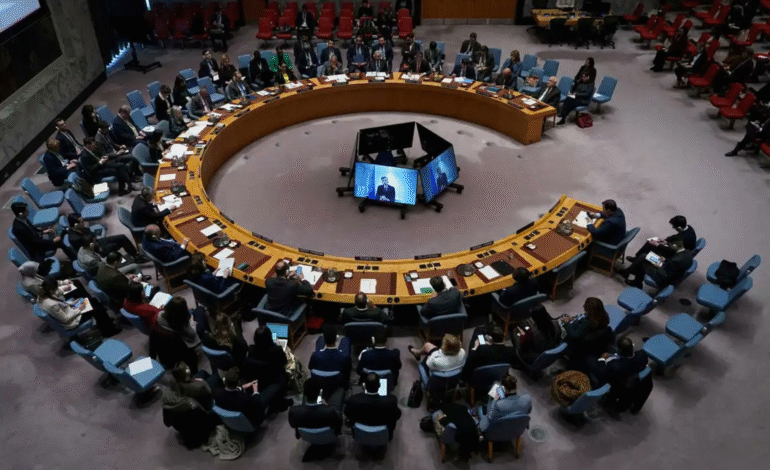The United Nations Security Council (UNSC) held a closed-door informal session on May 5, 2025, to deliberate on the recent terror attack in Pahalgam, Jammu and Kashmir. The meeting, initiated by Pakistan, aimed to address the rising tensions with India in the wake of the attack. The session saw significant discussion around the accountability of perpetrators and whether the Pakistan-based terror outfit Lashkar-e-Taiba (LeT) was involved. The council also firmly rejected the notion of the incident being a “false flag” operation, as suggested by Pakistan.
The Pahalgam attack, which occurred on April 22 and reportedly targeted civilians, drew widespread condemnation from international representatives. Although the UNSC session did not yield a formal resolution or statement, the discussions reflected serious concerns over the deteriorating security environment and the risk of escalation in the region.
Rejection of False Flag Claims and Calls for Accountability
One of the central points of debate was Pakistan’s assertion that the Pahalgam incident may have been a false flag operation, orchestrated to frame specific groups or individuals. However, multiple UNSC members openly questioned this narrative. According to sources cited by news agency ANI, members directly inquired about the potential involvement of Lashkar-e-Taiba, an internationally designated terrorist group. These pointed questions indicated a broader skepticism toward unsubstantiated claims and a collective emphasis on credible investigation.
Council members stressed that terrorism in any form is unacceptable and that civilians must never be targeted. The emphasis was placed on accountability and justice through lawful means, particularly with regard to those responsible for orchestrating or enabling the attack.
UN Secretary-General António Guterres underscored this sentiment, warning that the regional situation was “the most volatile it has been in years.” He reiterated the need to uphold international humanitarian law and condemned attacks on civilians, especially those seemingly based on religious identity. Guterres’s statement further strengthened the council’s consensus that justice must be pursued through credible mechanisms.
Targeting Civilians Raises Alarms Across the Council
The attack in Pahalgam appeared to target a group of tourists, with some UNSC members expressing concern that the victims were chosen based on their religious beliefs. This allegation, though still under investigation, raised alarm among council members who called for a thorough examination of the motive and tactics used in the attack.
Targeting civilians based on religious or ethnic identity has historically led to broader conflicts, and several members highlighted the importance of ensuring that such incidents are not allowed to destabilize regional peace. The Pahalgam attack, therefore, was seen not merely as a singular act of violence but as a potential flashpoint in an already sensitive geopolitical landscape.
The issue prompted a broader discussion on the protection of civilians in contested territories and how international norms must be enforced in regions vulnerable to sectarian or cross-border violence.
Pakistan’s Nuclear Rhetoric and Missile Tests Under Scrutiny
While the attack in Pahalgam was the immediate cause for concern, several members of the UNSC also turned their attention to Pakistan’s recent missile tests and nuclear-related statements. These actions were viewed by some as escalatory and potentially dangerous, especially in the context of heightened tensions with India.
There was a shared sentiment among council members that rhetoric related to nuclear capabilities must be avoided during periods of regional instability. The discussions suggested that while nations have sovereign rights to defense and deterrence, the international community must remain vigilant against developments that may lead to arms races or security dilemmas.
The missile tests, alongside the Pahalgam incident, added layers of complexity to the discussion and prompted calls for de-escalation from multiple sides.
Lack of Outcome Reflects Diverging Views Within the Council
Despite the gravity of the issues raised, the informal session concluded without a formal resolution, statement, or press briefing. The absence of an official outcome suggests differing perspectives within the council or a preference for discreet diplomatic engagement over public pronouncements.
According to diplomatic sources, there was a clear indication from several members that Pakistan’s attempt to internationalize the Kashmir issue had not garnered substantial support. The preference instead was for bilateral dialogue between India and Pakistan. This was reinforced by the council’s silence post-meeting, implying a lack of consensus on pushing the matter further in multilateral forums.
Pakistan’s Permanent Representative to the UN, Asim Iftikhar Ahmad, later remarked that the purpose of the meeting was to highlight the growing threat to regional peace. However, the international response indicated limited appetite for escalating the issue at the global level without stronger evidence or unified council backing.
Calls for Dialogue and Peaceful Bilateral Engagement
A key takeaway from the session was the reinforcement of dialogue as the primary avenue for conflict resolution. Assistant Secretary-General Khaled Mohamed Khiari reiterated the United Nations’ longstanding view that disputes between India and Pakistan should be addressed through peaceful, bilateral means. He encouraged both parties to engage in direct communication to prevent further deterioration of ties.
The emphasis on peaceful resolution was echoed by a Russian diplomat, who upon exiting the meeting, stated, “We hope for de-escalation.” Such comments indicated that despite the sensitive nature of the discussions, the council remained committed to fostering peace rather than exacerbating tensions.
The suggestion for bilateral resolution aligns with prior UN positions, where Kashmir has been treated as a bilateral issue unless escalations warrant greater international involvement. By emphasizing diplomacy over declarations, the UNSC sought to avoid inflaming the situation while still addressing the concerns raised.
Pahalgam Attack Poses Broader Regional Implications
What set the Pahalgam attack apart was its broader geopolitical significance. Jammu and Kashmir remains one of the world’s most contested regions, and any act of violence within it can have serious repercussions. The potential for retaliation or increased militarization heightens the need for calm and measured responses.
The attack’s impact on civilian lives, combined with its timing and possible targeting of religious tourists, made it a matter of international concern. Council members were especially cautious of the possibility that such acts might be part of a pattern intended to provoke wider unrest.
Although no formal inquiries were proposed during the meeting, there were mentions of the need for transparent investigations and possibly even third-party verification to ensure credibility. These suggestions, while not formalized, reflect a willingness within parts of the council to see future incidents handled through verifiable means.
Unified Stand Against Terrorism but Divided on Approach
While the council did not reach consensus on actionable steps, there was complete unity in condemning terrorism. Each member present reportedly affirmed that terrorism, particularly against civilians, is unacceptable under any circumstances. This unity reinforced the UN’s overarching stance that terror threats must be addressed with urgency and fairness.
Nonetheless, members remained divided on how to move forward. Some supported a stronger international role, while others emphasized regional autonomy and bilateral mechanisms. The informal nature of the session allowed for open expression without the constraints of drafting a formal resolution, but it also meant no collective action could be initiated.
This balance between shared values and varied strategies is a hallmark of the UNSC’s approach to complex disputes, especially those involving longstanding bilateral conflicts.
UNSC Maintains Watchful Neutrality Amid Rising Tensions
The UNSC’s informal meeting on the Pahalgam attack provided an opportunity for open discourse, even if it did not produce a concrete outcome. The refusal to endorse any narrative without evidence, the push for lawful accountability, and the encouragement for bilateral dialogue demonstrated the council’s intention to remain both engaged and neutral.
For now, the international community appears poised to observe further developments and is likely to revisit the matter should new evidence or escalations arise. The emphasis remains on dialogue, transparency, and de-escalation, with all sides encouraged to act responsibly in preserving peace.
Whether this event becomes a turning point or a missed opportunity will depend on how India and Pakistan respond moving forward. The UNSC, for its part, has made clear that while it may not intervene directly at this stage, it stands ready to support peace through dialogue and lawful action.








